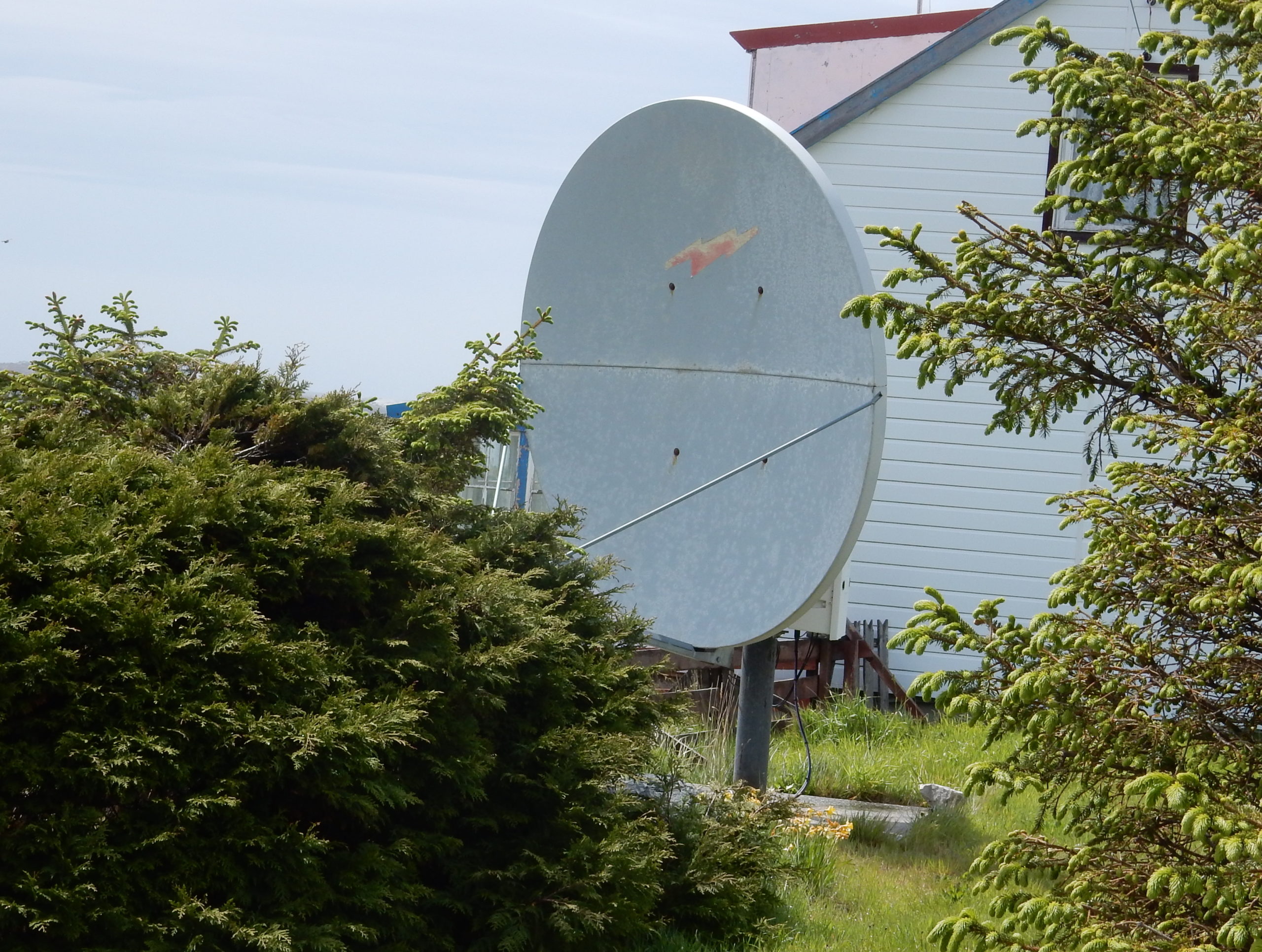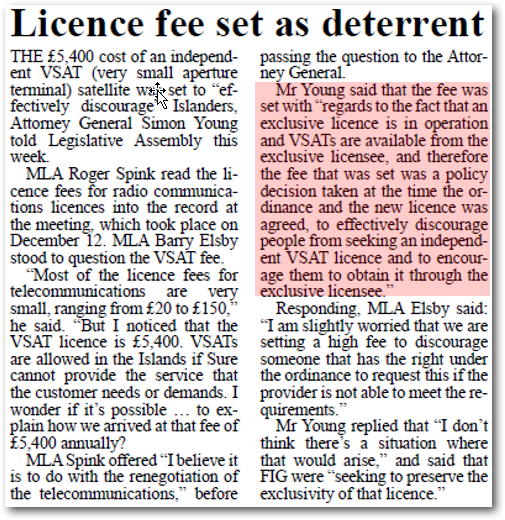Following my previous post – National Broadband Strategy: Subsea cable study, there is a subject that has not had sufficient public debate – Internet blackout resilience and business continuity.

With two Internet significant outages in the last year in April and November, Falkland Islanders know all too well about the consequences of an unavailable Internet. I’ll always remember the November outage which saw the only local bank closed for the day with a queue of customers outside of the entrance and the non-working Point of Sale terminals in the local supermarkets. It was down to luck that a cruise ship was not due that day. One local said to me at the time:
“…the cost to business e.g. FIC (Falkland Islands Company) is huge if the net is down. Locals could nip home and come back with a cheque book, but many were simply standing looking lost at the checkout tills. People had to leave the trollies behind loaded up with stuff which then had to be put back on the shelves.”
No amount of post hoc redress can compensate for the downright inconvenience consumers and businesses experienced. I am concerned that during the last year of activity of the Falkland Islands Government’s (FIG) National Broadband Strategy there has been silence about the reliability of the Falkland Islands’ Internet service and how businesses can be made more resilient to Internet blackouts. Was this not raised in the extensive sector interviews that took place under the auspices of last March’s Communications Week?
This could be considered to be a more significant issue for the islands than increasing satellite capacity.
In this post, I’d like to take a look at this subject in relation to island businesses and the knock-effects to their customers. To begin, it seems worthwhile to define several relevant terms:
Best-effort service: The Internet only provides a best-effort service of delivering IP packets between users and web sites with no delivery guarantees being possible. An ISP is not responsible for other ISP networks.
Business continuity: Every company these days depends on Internet connectivity to conduct its regular operation, so businesses must consider the risks of only having a single Internet service provider (ISP).
Resilience: According to Wikipedia, resilience is the ability to provide and maintain an acceptable level of service in the face of faults and challenges to regular operation. Threats and challenges for services can range from simple misconfiguration, natural disasters to targeted attacks.
Backup service: a backup is a mechanism that comes into play to provide connectivity when a communication service fails.
VSAT: A Very Small Aperture Terminal is a satellite communications system that serves home and business users. A VSAT user needs a box that interfaces between the user’s computer, a transceiver and an outside dish antenna.
Law of unintended consequences: The law of unintended consequences refers to how economic decisions or interventions – especially of government – may have unanticipated or unintended effects. Usually, this refers to a commercial law which distorts consumer or producer behaviour in a way that is not expected. These occur because policy ideas have not been fully tested or trialled
No company anywhere can rely on 100% availability of the Internet. This the nature of the Internet the world over but no more so than in the Falkland Islands due to the reliance on a satellite for connectivity to the outside world.
What shocked me most about the November 2019 blackout was that there seemed to be few business continuity capabilities in place so that vital public services could be maintained during the Internet blackout. A classic business continuity issue.
However, why does a monopoly business such as the Standard Chartered Bank does not have a business continuity capability, and why is this ‘allowed’ to continue for such a core island service?

I was informed that the bank had previously used a VSAT terminal for business continuity purposes, but it was taken out of service several years ago. The non-functional VSAT dish is still located in Stanley as can be seen on the left. What are the circumstances that could have led to this, I wonder?
What about other Internet-dependent businesses such as the Falkland Islands Company’s retail operations and their Point of Sales (POS) terminals? Surely, there is a FIG obligation and role here through the National Broadband Strategy to ensure that working business continuity capabilities are in place?
In the Falkland Islands, business continuity capabilities can only be provided by VSAT terminals. I’m aware of the complex history of VSAT provision on the islands, but VSATs are practically ancient technology and are hardly challenging to implement. So what is the cause of the issue?
Could one of the issues be down to failed cost/benefit analysis undertaken by businesses?
A classic case of the law of unintended consequences?
My jaw dropped when I read the following article concerning the use of VSATs in the December 13th 2019 issue of Penguin News:

“Slightly worried” seems to be a bit of an understatement in the circumstances.
Does it state that an extremely high price for a VSAT product was set in law to discourage the use of VSATs under the regime of an exclusive telecommunications licence? Well, yes and this why.
The first public reference to VSAT being not-allowed was in EXCO’s 2015 paper 37/15, Strategic Telecommunications Review – Part A Landscape report – section 2.2.4, which presented the results of a report by Cartesian undertaken in 2015 which stated in the unredacted parts:
“From a regulatory perspective, there are a number of gaps within the current regime which raise uncertainty as to the scope of the licence and the extent of obligations placed on Sure. For example, rules with respect to VSAT supply will need to be clearly defined in the new Ordinance and licence (note, we recommend that VSAT self-supply is not allowed at this stage).“
Maybe, in the redacted parts of the report, there was a discussion about the impact of businesses?
The first FIG VSAT position options were first articulated in Clause 4.7 of the 2016 Communications Bill EXCO paper 163/16B. However, the specific policy adopted and outlined in Appendix B: Proposed Government policy on self-provision of VSAT, was redacted.
“People who self-provide are not contributing with the rest of the community to the joint cost of the exclusively licenced service which theoretically makes the cost of the service per customer higher than it would otherwise be. Self-provision is not outlawed completely but is instead available to individual private users (not commercial users) at a licence fee designed to dis-encourage self-provision. The fee could be seen as compensating the public interest for operating outside the regime. A proposed policy statement about how this might work is set out at Appendix B. The Government could identify the illegal users and make them stop either by threatening them with prosecution or actually prosecuting them.”
Research showed that the pricing policy (Communications (Fees) Regulations 2019) was determined by clause 5.6.3 in the recent 130/19 Communications (Amendment)(No 2) Bill 2019:
“The fee set for VSAT is in line with the policy approved by EXCO under paper 163/16 which states that the VSAT fee will be no less than the total annual cost of the operator’s largest commercially realistic, generally available, package.”
The annual fee for a yearly VSAT licence is now £,5,400.00.

Recently, the Communications Regulator summary annual report 2017-19 issued in December 2019 states:
“The regulation of VSATs has been a subject of much heated debate for the past 10 years. Attempts were made to bring in legislation under the Telecommunications Ordinance, however this was unsuccessful and a decision was made that a greater overhaul of the legislation was required. In 2016 EXCO made a clear policy statement as to the intent to licence VSATs and what the licence fee should be (see EXCO paper 163/16). As of 15 November 2019 the legislation is now in place that enables the licensing of VSATs.”
In my opinion, prevention of the use of unlawful VSATs should be achieved through formal ‘cease and desist’ warnings with the threat of legal action, not by market price manipulation as this always has unforeseen consequences.
Encouraging consumers and businesses to not use a particular product by significantly increasing pricing may well work to reduce smoking, alcohol and sugar consumption (though I think the jury is out on this), but applying such an approach to a critical telecommunications technology whose use is mandatory for business continuity is asking for trouble. These things need to be considered from a holistic technical and commercial perspective.
The policy was created to make sure that consumers do choose the option of using self-sourced VSATs and, by doing so, divert revenue away from Sure Falkland Islands to protect their income and monopoly. One of the unintended consequences is that FIG has prioritised the financial security of Sure Falkland Islands over that of the island’s businesses. This level of pricing disincentivises all companies, whether they be small, medium or large (by Falkland Islands standards), from providing the 100% availability of their services that their customers expect.
Could this policy be trying to solve an issue that may not now exist as the policy was formed four/five years ago? The performance and the sizes of quotas of the Internet access service have improved in recent years, so how many consumers could be bothered to go the trouble of self-providing a VSAT in 2020? Not many, I would have thought.
Other business services caught in the blanket policy
There are several companies on the Falkland Islands whose direct-to-consumer services necessitate the use of VSATs to deliver their services and not just for business continuity reasons. For example, VSATs are used to deliver video and audio streams to the islands that are accessed directly by Falkland Island Islands’ consumers.
Artificially ramping up the cost of VSAT services has the effect of possibly making such services, and the businesses that deliver them, them unprofitable. This will undoubtedly directly affect the development of new innovative media services.
Case study: A specific example of this issue has been experienced by KTV Ltd, who run a subscription media service in the Falkland Islands. For over ten years KTV had streamed the popular Saint FM Community Radio to their customers in the Falkland Islands using their self-provisioned VSAT. However, due to the much-increased VSAT licence fee, they had little choice but to stream the channel from St Helena over the Internet using a Sure Platinum package.
This provides a much inferior service to a VSAT with the Internet link dropping out multiple times resulting in the channel going off-air. And, of course, there is no business continuity capability. KTV would revert to using a self-provisioned VSAT if it was available at market prices. It should be remembered that an audio stream does not require anywhere near the download speed offered by the top Internet packages (128kbit/s) but, reliability is an absolute must.
KTV seriously considered stopping the provision of this channel but thought that would be very unfair to Saints. Hence, they decided to accept a sub-optimal way of connecting to the St Helena channel.
The solution
A VSAT business continuity product does NOT require any of the principal features of the highest-cost Internet package, e.g. top-end download speeds or top-end quota levels. It just requires sufficient speed to enable the public-facing machine-to-machine (M2M) data services to function during a blackout. There is nothing complicated about this.
The solution would be to create a general license for a VSAT business continuity service or VSAT Media Distribution. The particular use application would be specified in an addendum together with required technical specification e.g. maximum download speed and contention ratio. The Licence should in line with world VSAT market prices., i.e. 3rd-party cost plus a 10% Sure Falkland Islands management fee.
Any licencing regime relies on trust that the licence would be used for its intended purpose, and it would be no different in this case.
However, the problem is that the law determining the price would need to be changed to allow the creation of a market-priced VSAT business licence. That’s always the issue with unintended consequences – they are not easy to resolve and can disrupt valid use.
Round-up
The question of the high cost of VSATs for valid business applications needs to be addressed with some joined-up thinking. Working toward the provision of application-oriented VSAT licences would be a sensible starting point.
I believe that a core activity of FIG’s National Broadband Strategy in 2020 would be to include an Internet resilience activity thread. This should encompass all critical internet-dependent public services so that the severe inconvenience experienced in the November outage can be avoided in the future. FIG should be formally challenging private companies and their departments to incentivise them to provide appropriate business continuity capabilities.
I do hope that this subject is taken seriously and evaluated by FIG, MLAs and the Chamber of Commerce going into 2020.
Copyright: January 2020, OpenFalklands

This is just frigging insane!
The Sure monopoly should just be terminated, especially as they do such a poor job of providing service. No company should be allowed to hold a whole country hostage.
The problem is only going to be exaggerated as new next gen satellite services come online. It would be criminal if Falklanders could not use Starlink et al. as they become available.
Out of interest, what exactly is stopping Falklanders getting Starlink? How is it in 2021 a company is allowed to have a monopoly in communications??? This just prevents future competition and development.